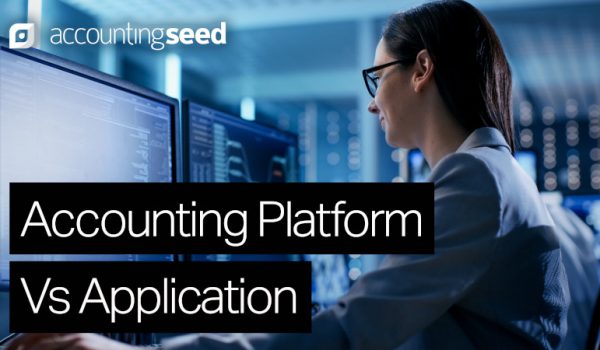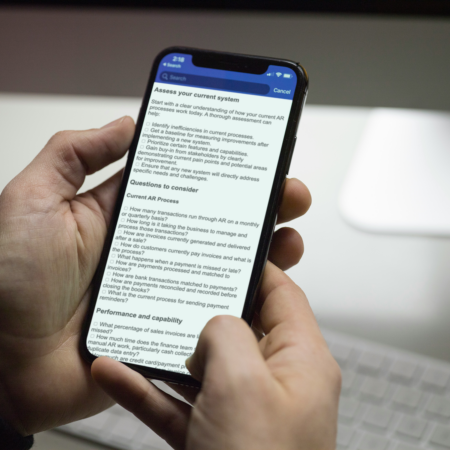
An accounting application typically only works one way, while an accounting platform is a toolset used to build an IT solution around your exact accounting needs. Let’s dive into the differences between accounting applications and platforms.
Why Does Accounting Technology Matter?
As businesses grow and develop, they naturally become more complex and unique. The resulting dynamics of the individual operation means that financial data and management becomes just as unique and complicated.
This is why the differences between an accounting platform versus an application matter. One enables you to grow freely and adapts to this growth, while the other doesn’t. Whether you’re a C-level executive, a division or department lead, IT administrator, or company accountant, this impacts your work. Remember, accounting data is tied to sales, support, and operations. The accounting system structure directly impacts how fluidly other applications and departments can understand and process accounting information.
Accounting Application vs Accounting Platform
Accounting Applications
What separates an IT platform from an IT application is the level of control and operational dexterity it allows. An accounting application’s goal is to just help you manage your accounting. It’s equipped with the important, but basic, tools to do so. An app may allow you to customize some aspects of your accounting process, but this tends to be limited.
Some accounting apps allow for small customizations like adding a data field or automating a small number of tasks with scripts or macros. However, this usually doesn’t fully satisfy more overarching business requirements. You’ll be able to access functions and perform key processes, but generally, you’re restricted to the framework of the accounting application. An accounting application is designed the way the designer thinks is the best way to process and report your accounting records. Therefore, you cannot customize the system in a way that best works for you. The framework of an accounting application is useful, but more companies now require tailored solutions to fulfill desired goals. This is where platforms excel over applications.
Accounting Platforms
An accounting platform isn’t just a framework, it’s also a toolset letting you dictate how you use the technology. An accounting platform is an IT stack of technology designed specifically for you to build on top of it. IT platforms are designed to be tailored according to user needs. You’ll have basic accounting system functions, but platforms also contain features with more advanced ways to control the overall system. Accounting platforms let you easily add unique custom data tables, data fields, user interfaces, and automation relevant to your precise operation. This differs from a basic accounting application that remains set in what it offers.
The design goal behind accounting platforms is to offer more advanced functionalities in a way that you can continue build upon features for better use. What really makes your accounting functions scale are the platform features that help you navigate and manage the solution. In fact, many of your business processes can be completed with clicks and minimal code. This allows you to layer package-related and custom features on top of one another to create the solution that’s just what you need.
With an accounting app, you must build almost all customization on a separate IT technology stack next to the app. Then, you’d need to send data back and forth between the custom technology stack and the accounting app through its application programming interface (API). And this is assuming it has a robust API strong enough to manage this data exchange.
Which Should You Choose?
An accounting application may work well for a small, starting company, but if you’re experiencing or anticipating growth, you need an accounting platform. With an accounting application, you will reach a point where you outgrow the tool. The more complex your organization gets, the more it benefits you gain with an accounting platform. Otherwise, you’ll be forced to shop for and select another accounting app to scale up from your previous one. And here’s the heart of the problem.
Choosing an application that just fits your current needs at the time is an expensive proposition. It also risks the continued efficiency and accuracy of your accounting. This is because as soon as you implement this app, you start outgrowing it, again! To account for your growth, you must invest in more and more tools – unless you have an accounting platform that can be altered so that it grows with you. One of the best reasons to choose a platform over an app is the core ability to customize and automate your business process in the way you desire it to be.
When to Use an Accounting Platform
A fast-growing company will tend to outgrow a specific accounting app in 24-36 months. A slow-growing company will do so in 5-7 years. With a true accounting platform, you will never outgrow the technology since it’s capable of changing with you along the way. Remember, a platform is more of a living part of your infrastructure that changes as you do. This ability to layer your changes and automation right on top of the pre-programmed accounting features gives you both structure and flexibility: the cure to your increasing uniqueness and complexity!
The Accounting Seed Platform
There’s only one accounting platform in the world, while there are thousands of accounting applications. This accounting platform is Accounting Seed. Whether or not you have Salesforce, Accounting Seed offers a comprehensive, automated accounting platform optimized to work with any business. Utilize the full functionality of your existing Salesforce ® management system or simply use Accounting Seed as a stand-alone product. Accounting Seed’s robust and flexible design lets you fully pilot your entire back office in the way that best suits your individual business needs.
See Accounting Seed in action
Get a close-up view of how accounting on Salesforce can eliminate the need for costly integrations—and silos of mismatched information—by sharing the same database as your CRM.


